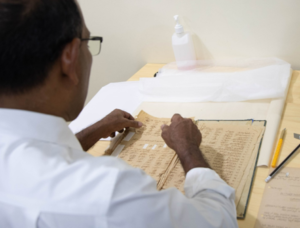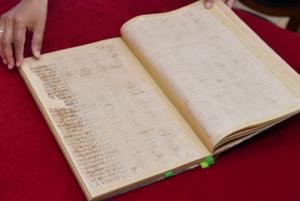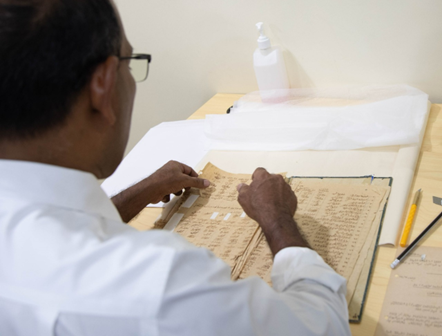Restoration journey: Maldivian parliament’s experience
The first restoration work in the history of the Parliament of Maldives began in 2022 with a nearly century-old book stored in the Parliament. There are many old documents and books stored in the archive section of the Parliament; however, documents have been damaged and lost due to frequent changes in the Parliament building and mishandling of the documents. The existing archival materials are preserved and kept in the archive safely. Among those, the oldest archived book is the members’ attendance registry of the first parliament of Maldives. This book is dated in Islamic date – 10th Rabi-Al-Awwal 1353AH (22 June 1934, Friday) to 17th Jumada Al-Awwal 1358 AH (5 July 1939, Wednesday), with its pages ripped off and papers so brittle that it was in an extremely delicate and fragile state to touch or use. Since there was no prior experience in restoration work of this kind, the idea of preserving these books seemed like an impossible feat.
Thus, the Speaker of the Parliament His Excellency Mr Mohamed Nasheed encouraged the initiation of preserving these old materials in the Parliament archives. With his support and advice, the restoration works commenced in the library and archive section of the Secretariat of Parliament on 3 April 2022. This has paved the way and boosted Parliament’s motivation to continue the restoration of other century-old documents within Parliament.

Getting the necessary raw materials and equipment for the restoration works was one of the biggest challenges. After obtaining the equipment and tools from suppliers in the Maldives, it took four weeks to complete the restoration of the book. First, the pages of the book were separated. Then, the pages were washed with a diluted alcoholic solution in a tray and the papers were left to dry by spreading them on a flat surface. It was found that the pages with lots of holes and tears needed mending. These pages were carefully patched using paper which best matched the original paper. It was decided that Japanese tissue be used on all pages to ensure its durability. Borders were added to the cover page and repainted with a colour best matching the original before rebinding the book. To avoid mistakes, the book was scanned prior to the restoration process and before binding. A set of dummy signatures was created to guide the binding work.

Following the restoration of the attendance logbook, more documents were also restored. All these documents are scanned and stored in the Archives’ digital repository. With experience in restoration works, the staff is henceforth confident and motivated to do related work. A lot of institutions have shown interest in restoration work now as they better understand that that necessary equipment and accessories can be acquired or made locally. In addition to the restoration work, the Library and Archives of People’s Majlis have taken another step to do in-house bookbinding of the publications of the Hansard of Parliament sessions, and other documents which may have to be stored for record purposes.
Library and Archives of People’s Majlis hope to see more libraries and institutions take the initiative to restore and preserve their collections as the handwritten records in any institution are vital cultural heritage – not only to the institution which holds the collection, but to the country too. We are willing to provide training and assistance to other libraries and institutions who are keen to restore and preserve their collection. In an effort to educate the public, the Library and Archives of People’s Majlis shares an archival document every week on its Twitter account – @mvpeoplesmajlis.
Written by Mahasin A. Didi and Zidna Mohamed, Library and Archives of People’s Majlis, Maldives.





